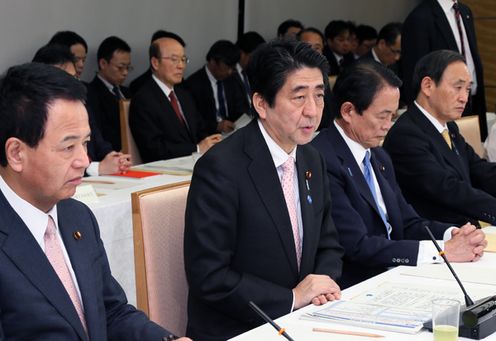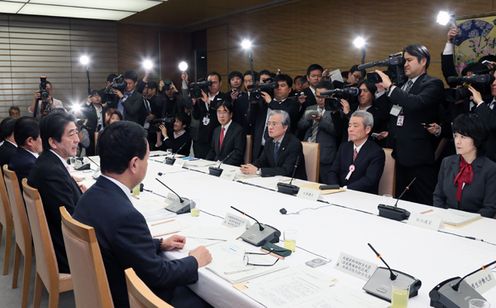Home > News > The Prime Minister in Action > March 2014 > Council on National Strategic Special Zones
Council on National Strategic Special Zones
Friday, March 28, 2014

Photograph of the Prime Minister delivering an address (1)

Photograph of the Prime Minister delivering an address (2)
Prime Minister Shinzo Abe held the fourth meeting of the Council on National Strategic Special Zones at the Prime Minister's Office.
During the meeting, debate took place on the Employment Guideline, etc. and the designation of the National Strategic Special Zones.
The Prime Minister said in his address,
"Today, during this meeting, we were able to identify the zones that will be designated as National Strategic Special Zones and to present reform guidelines for the respective zones. First of all, I would like to thank the members of the Council for carrying out intensive and prompt deliberations since January of this year.
Ever since I proposed the idea of National Strategic Special Zones in June of last year, we have given priority to 'speed' and 'execution.' We immediately managed to pass the Act on National Strategic Special Zones during the Diet session in autumn. We were able to incorporate into the Act the reform of so-called vested interests which went untouched for years, including the alleviation of hospital bed regulations, the clarification of employment rules, the reconsideration of agricultural commissions, and the lifting of the prohibition on the private management of public schools.
As the next step, we must further flesh out the zones and programs in order to execute these regulatory reforms. Of the designated zones presented today, comprehensive regulatory reforms will be implemented in a variety of sectors, including urban renaissance, medicine, employment, and education, for expansive metropolitan areas, such as the 'Tokyo area' and 'Kansai area,' to make them 'centers of international business and innovation' that will become hubs for attracting talent, capital, and technology from around the world.
Furthermore, 'Niigata City'; 'Yabu City' in Hyogo Prefecture; and 'Fukuoka City' – municipalities full of motivation – will become 'centers of reform' of areas of vested interests, such as agriculture and employment, and help
achieve a breakthrough for driving forward with the liquidation of farmlands and the provision of support for ventures and business start-ups.
In addition, for the six National Strategic Special Zones, including 'Okinawa Prefecture,' which has vast tourism resources, the national government, local governments, and the private sector will work together to compile specific program plans, some of which will be completed by as early as this summer.
In less than one year since making the proposal, the National Strategic Special Zones or a system for actually mobilizing 'drills for breaking down vested interests' has been established. I am determined to work with an even greater sense of speed than before to put the reform of all vested interests up for discussion in the next two years and achieve a breakthrough.
There is no end to the regulatory reforms of the Abe administration. There is also no sanctuary. If proposals for bold regulatory reform are made, including for the areas affected by the Great East Japan Earthquake, we will continue to address them in a flexible and speedy manner, and ensure that they contribute to fleshing out program plans and the designation of new specific zones."

